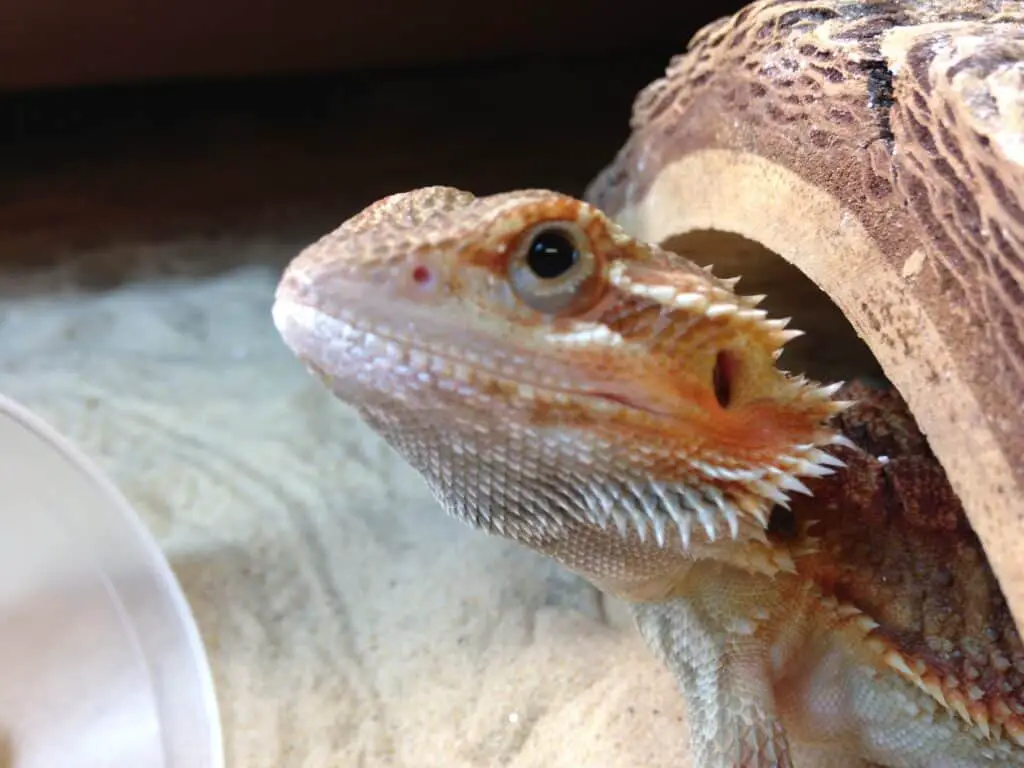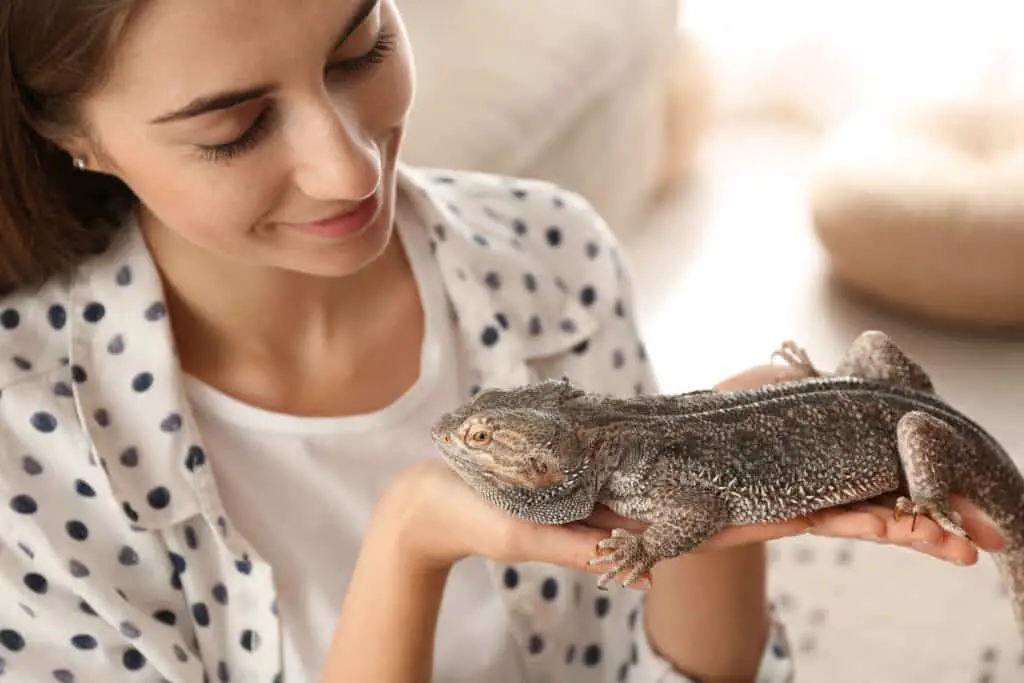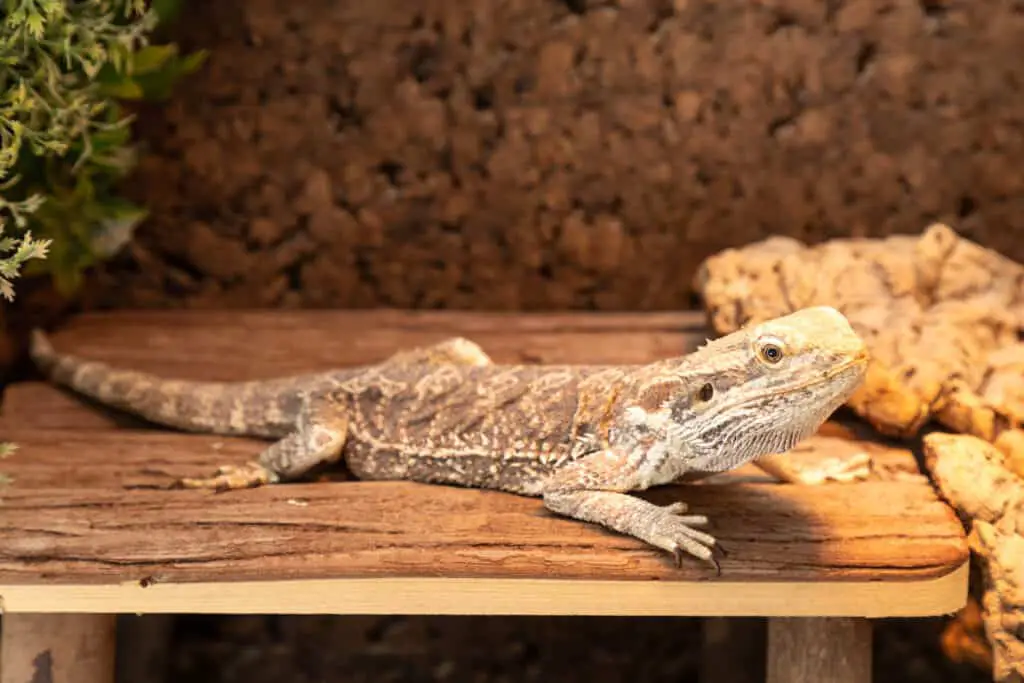
Bearded dragons have become very popular pets in recent years, but how can you tell if your bearded dragon is happy or not?
Bearded dragons are happy if they are not showing signs of aggression or running away. They are also happy if they are lying flat with muscles relaxed, sit on your chest, let you pick them up, are eating normally, have dilated pupils, or have a bright skin color.
These reptiles might not be as outwardly affectionate as dogs or cats, but they have their own signs that can demonstrate that they feel comfortable with you. There are many ways to tell if your bearded dragon is happy living in your home.
It Doesn’t Show Aggression
If your bearded dragon is happy, it will not show any signs of aggression. Its beard will be flat, it will be really quiet and not hiss at you, its head will be moving normally, and it will generally seem very content.
If it is not happy and does not like you, it will bite, bob its head, puff out its beard, and hiss at you.
Source
It Doesn’t Run Away From You
If a bearded dragon does not run away from you when you approach its tank, then it is happy and likes you. Bearded dragons run away and hide if they are unhappy or scared, and run away often when they are still getting used to their new home. After they have fully adjusted to their new home and are happy and feel comfortable in it, then they can be seen climbing on the different obstacles placed in the enclosure.
Source
Sometimes bearded dragons might feel uncomfortable being picked up, so you can try to reach your hand into its tank and invite it to climb up. Place your fingers under its chest to help it feel secure and supported. If it climbs up of its own free will, that’s a good sign!
Source
It Likes to Lay on Your Chest
If your bearded dragon seems to like laying on your chest, then it is happy and content, especially when it is with you. If it lays on your chest for a long time, then that means it really likes you. This is great because then you can show it off to a lot of people who also like bearded dragons and your bearded dragon will not likely freak out or become aggressive.
Source
It Lets You Pick It Up
If your bearded dragon lets you pick it up, then it is very happy and likes you. As we mentioned above, if you put your fingers under your bearded dragon’s chest and if it climbs up onto your arm, then it likes you and likes to be handled by you.
Source
If your dragon is unhappy, scared, or does not like you or being handled, then it will run away from you, become skittish, and will not let you pick it up. It may also be a sign that it does not like being picked up and handled.
If your bearded dragon typically likes being picked up but suddenly doesn’t, then leave it alone for a few hours. It may just be tired and doesn’t want to be held at the time. Everyone gets tired of attention sometimes!

It Climbs on Your Shoulder
If a bearded dragon climbs up your arm onto your shoulder, then it is happy and likes you. Bearded dragons like climbing up to high places and are natural climbers, but the fact that you can move while it is on your shoulder concerns it. If your bearded dragon climbs up on top of your shoulder, then it means that it is happy with you and trusts you.
Source
If your bearded dragon falls asleep on you while you are holding it or while it is on your shoulder, it means that it is very happy and trusts you implicitly. If you want it to fall asleep on you, then stroke its head while it are laying on your shoulder or chest.
Source
It Is Healthy and Functioning Normally
If your bearded dragon is functioning normally, then it is happy. If it is sleeping, eating, basking under their heat lamp, drinking, and pooping normally, then it is happy and healthy. If it is alert, looking around, and moves around frequently, then it is happy. Bearded dragons are very curious creatures, but they will not be curious if they are unhappy or unhealthy.
Source
A happy bearded dragon typically is healthy. If it is unhappy, then it may stop eating and drinking, which is not good and may cause other health issues to occur.
It Wants to Get Out of Its Enclosure
If your bearded dragon seems to want to get out of its enclosure while you are sitting in the room with it, then it is happy and likes you a lot. This will only happen after it has settled into its enclosure. If it has not had time to get used to being in its enclosure, then it just wants to get out of it because it is not used to being in the enclosure.
If it has gotten used to being in its enclosure and stands on its back legs and scratches the glass while you are in the room with it, then it likes you and wants to be with you. This also means that it is very happy, and it trusts you a lot.
Source
It Is Laying Flat
Sometimes a bearded dragon will lay completely flat with its muscles relaxed. This means that it is very relaxed and it trusts that nothing will happen to it.
Source
However, if your bearded dragon is laying flat and its muscles are very tense, then it means that it is scared and wants to hide, but doesn’t think it has any places where it can hide and be safe.
If your bearded dragon is laying flat and seems to be very lethargic, then it might mean that it is sick and does not have the energy to fight and move around. If this happens, take it to the vet for a check-up.

It Becomes a Bright Color
If your bearded dragon has changed to a brighter color since you got it, then it means that it is very happy. If your bearded dragon becomes orange, light brown, or yellow, then it is happy. This is because bearded dragons have chromatophores in their skin.
Chromatophores are cells that are pigmented and reflect light when it hits them. This allows bearded dragons to change color and adapt when their environment changes and helps them become camouflaged. But the chromatophores also change when the bearded dragon is happy and warm. So if your bearded dragon is slightly darker than it usually is, then it is probably in a bad mood.
Source
Dilated Pupils
If your bearded dragon has dilated pupils, then it means that it is relaxed and happy. It also means that it is interested in you and what you are doing. If your bearded dragon closes its eyes frequently, especially around you, then it is happy and trusts you implicitly.
Source
If your bearded dragon is unhappy or sick, then you will be able to tell by looking at its eyes and its behaviors. If your bearded dragon is sick or unhappy, then its eyes will be unalert or sunken. If your bearded dragon’s eyes are sunken, it may be dehydrated, so make sure to give it plenty of water.
If it doesn’t get better soon, take it to the veterinarian for a check-up, and they will prescribe the medicine it needs to recover.
If your bearded dragon’s mouth is closed and curved, and kind of looks like it is smiling, then it is very happy and interested in what is going on. It may be hard to tell if your bearded dragon is smiling unless you have owned it for a long time and have learned how to tell the difference between its normal mouth shape and when it is smiling.
Source
It Is Waving at You
If your bearded dragon seems to be waving at you, then it is very happy and likes you a lot. It is its way of acknowledging your presence and telling you that it sees that you are there, so you don’t think that it is ignoring you. If your bearded dragon is slowly waving at you, it is very happy and content, and you can leave it alone if you want.
However, if your bearded dragon is waving at you, it can also mean that it is trying to get your attention and tell you that there is something in its enclosure that is stressing it out and it wants you to get it out and take care of it. If your bearded dragon seems to be frantically waving at you, then go over to its enclosure and ensure everything in its enclosure is how it should be. If something is in its enclosure that should not be, carefully remove it.
Source
How Can I Tell if My Bearded Dragon Is Unhappy?

If your bearded dragon is unhappy, then it will fluff its beard, hiss, gape its mouth, and try to bite you when you go near it. If your bearded dragon is doing any of these things, leave it alone until it seems to calm down and relax. However, not all of these signs always mean that your bearded dragon is unhappy.
If your bearded dragon is closing its eyes while it opens its mouth, then it is happy, and most likely basking underneath the heat lamp or heat source in its enclosure. In fact, most of the time when it is opening its mouth, it is basking in the heat from the heat source and will do this very frequently.
However, if it is showing other signs of unhappiness or aggression, then leave it alone for a little while. If you continue going near it, then you may get hurt, and your bearded dragon will become more stressed than it needs to be.
What to Do if Your Bearded Dragon Is Unhappy
If your bearded dragon is unhappy, there are many things that you can do. If you have recently acquired your bearded dragon, give it time to acclimate to its new environment. It may take a few weeks, but it will eventually get used to the new environment and begin to show signs that it is happy. However, if you have had your bearded dragon for some time, or just want to make its enclosure more comfortable for it, there are a few things that you can do.
Invest in a Vivarium
If your bearded dragon is having trouble adjusting to its new home, then it might need a new vivarium, or the vivarium that it is in may be too small. Bearded dragons need a vivarium that is at least 4ft x 2ft x 2ft so they have enough room to roam around and grow.
Source
Turn Lights off at Night
If you want to make your bearded dragon more comfortable, turn off the lights in their vivarium and the rest of your household at night. Bearded dragons are diurnal, so they are active during the day, and sleep at night. They are kind of like humans that way. No one likes trying to sleep while the lights are on.
When you turn off the lights, make sure that your bearded dragon still has a constant heat source, as it is cold-blooded and needs constant access to a heat source.
Add Variety to Its Diet
Make sure that your bearded dragon’s diet has a variety of bugs and vegetables. Bearded dragons eat vegetables and live insects, so give it plenty of both. Also, make sure that your bearded dragon is eating enough, and that it is getting enough vitamins.
Don’t Overcrowd Them
Don’t overcrowd your bearded dragon. If it seems to want space, give it space, especially while it is getting used to your presence. If you give it the space that it needs and feed it enough, then it will eventually get used to its new home and become happier than before.

